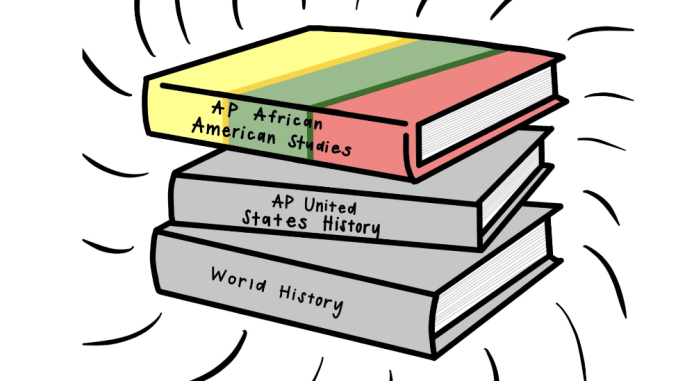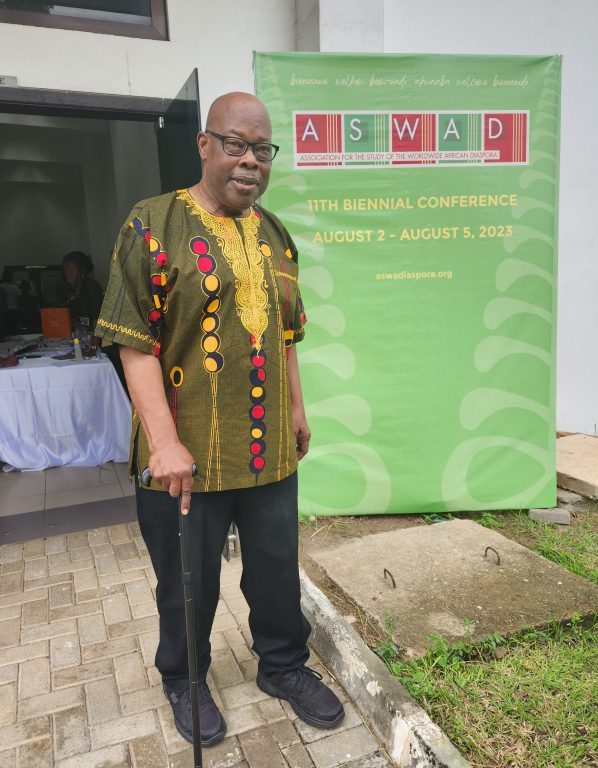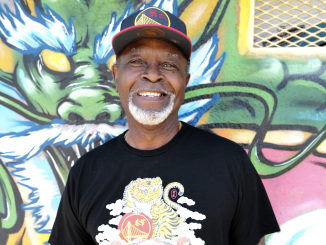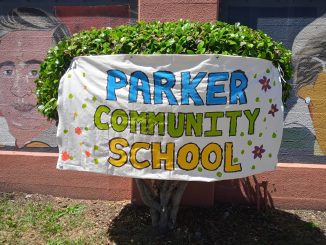
Editor’s Note: This story first appeared in CCSpin.net, the website for Contra Costa Youth Journalism.
When enrolling for classes for the upcoming school year, some Bay Area students will find a new, unique course option that promises a deep dive into the history and contributions of African Americans across the globe.
A half dozen high schools will offer Advanced Placement (AP) African American Studies in 2024-2025. This is the first year the course will be available to all U.S. schools following a two-year pilot program by the College Board.
In 2022, the College Board, a nonprofit organization that is responsible for the AP course system, initiated a pilot program for AP African American Studies in 60 schools, followed by expansion to 700 schools nationwide in 2023.
Bishop O’Dowd High School in Oakland was part of the pilot program and the first school in the Bay Area to teach the class.
“The first pilot year I had 65 students. This year I have 68. Three sections each year. The class is popular because the class is far different than those based purely on western civilization. We cover African History, African influence on European History, and the influence of African culture on the diaspora since the beginning of the trans-Atlantic slave trade in 1433,” Bishop O’Dowd AP African American Studies teacher Tony Green said.
“Based on my teaching Black Studies for 30 years and AP African American Studies in particular, I think that all students will be able to view African Americans as valued members and contributors to American society rather than caricatures based on ignorance of African and African American history and culture,” Green said.

Lowell High School in San Francisco and four schools in the Acalanes Unified High School District (AUHSD) in Contra Costa County are offering the course for the first time.
“I just think African American Studies hasn’t historically had a big place in the curriculum. I hope that it will kind of open up our students’ minds to recognize the kind of contribution of the African American population in this country,” AUHSD Superintendent John Nickerson said.
In anticipation of the introduction of AP African American Studies to the Bay Area for the 2024-2025 school year, administrators, students and community members engaged in discussions regarding the potential impacts of the course within school communities. During those discussions, there was only minor disapproval.
“The pushback was not really about the content of the course. There was nobody pushing back saying we don’t need African American studies,” Nickerson said. But “there are some pushbacks that we don’t need another Advanced Placement course. And then there’s always pushback where teachers fear that because a new popular elective is introduced, other electives will fall off and maybe the courses that they’re teaching.”
AP courses are often more rigorous than regular high school classes, as they are undergraduate-university level. High school students enrolled in AP classes can earn college credit and placement if they pass a culminating AP Exam.
Another debate was the proposition of introducing African American Studies as a separate course, rather than integrating the course content into mandatory history classes including U.S. History and World History. While some express concerns that teachers may omit certain information under the assumption it will be taught in AP African American Studies, many believe that a focused space for African American history will benefit students.
“I think one of the biggest problems in American conversations surrounding anti-racism, justice, diversity, equity, inclusion, bias, anti-bias is that we go way too broad and it’s impossible to have the prolonged, specific, useful conversations that we need to have,” Zachary Reese, an assistant professor in the Department of Psychology and former African American psychology professor at the University of San Francisco, said.
“And that’s what I really like about the creation of this kind of course. Yes, it does create a separate space and other people might feel less a sense of responsibility, but also it creates a really neatly focused space to work on a specific problem and highlight a specific group of people and celebrate a specific group of triumphs.”
AP African American Studies spans over four historical periods from approximately 900 BCE to the 2000s. It is an interdisciplinary course in which students will analyze primary sources, engage in historical discourse, and write about their learnings.
Diverging from traditional AP courses, AP African American Studies invites students to delve deeper into a topic of their choice through the Individual Student Project. This component allows students to develop an argument regarding a chosen topic or event and present their findings to the class.
“Since it’s a project-based course, it gives students a lot of opportunity to find out what they’re really interested and curious about learning more about,” Acalanes High School English teacher James Muñoz said. “I actually think that this course is a transformational course because it doesn’t just exist within the College Board framework. It actually invites students to be more proactive in their communities.”
Class discussions play a pivotal role in unpacking course material in AP African American Studies. Some believe it may help foster a deeper understanding and personal connection to the content.
“We all have some experience being racialized people and that makes it so the content is like easy to wrap your mind around, easy to relate to. And the benefit of relating to content is that we pay more attention to it, we are more likely to remember it and we’re more likely to integrate it in our daily life. So I think discussion and personal reflection is super key in this class,” Reese said.
Educators say AP African American Studies brings students the opportunity to learn about experiences and histories that may differ from their own, broadening their understanding of identity and societal dynamics. Engaging with diverse perspectives in the classroom can better equip students to navigate discussions about race and racial inequality with more confidence, they maintain.
“The Bay Area is really unique in that we have a lot of racial, ethnic, cultural diversity, but we’re super spread out. We’re super segregated as peoples. And I think this can lead to this effect where people know about their own racial, ethnic and cultural experiences but surprisingly little about others,” Reese said. “And I think this class is one that encourages people to look outward, even if they are Black or African American, to think a little bit more broadly about what it means to be a racialized person living in the United States and to sort of critique some of our preconceptions and open ourselves up to other people’s experiences.”
Some students say they value having a focused space where they can explore history in unique ways, different from the conventional approach found in other history classes.
“African American injustices are often taught as a small subtopic of the history curriculum, so a whole class dedicated to it could help the Acalanes community learn about new ideas and topics. Acalanes in particular has a very small percentage of African Americans on campus, and this class could allow people a more detailed view and a deeper understanding of [those] students on campus,” Acalanes High School junior Kate Roberts said. Roberts took an Ethnic Studies class and is considering AP African Americans Studies.
Roberts said she believes that AP African American Studies could positively affect their school community in ways that transcend the classroom.
“I think that if everyone at Acalanes took some sort of cultural studies class it could change our culture. Acalanes is not particularly diverse when it comes to race, so many of us don’t understand how race disparities play into school communities. I think that we would be able to recognize many issues that circulate on campus, and everyone would have a greater knowledge on how to solve issues. People may have more open and accepting minds as well, which would be very beneficial for our community,” Roberts said.
Acalanes High School Principal Eric Shawn added, “The skills that [students] develop by learning diverse perspectives and histories and contributions, and the way that they study, will expand their and our knowledge of what is possible.”
Haley Chelemedos is an 11th grader at Acalanes High School in Lafayette.




Be the first to comment